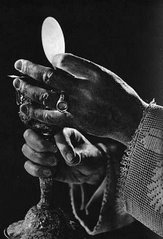Beth Reed is in surgery as I am writing this, having the brain tumor that rendered her deaf removed. I spoke to Joey Reed a few minutes ago, and he tells me so far so good, and that he's not certain how long the surgery will take. Please pray for her as the day unfolds.
Michael Denton and I went out to Ville Platte to visit Joey and Beth at his parents' home on Saturday night. Michael was taken by the joy Joey and Beth displayed even with today's struggle impending, even after everything they have been through. Joey is 24, Beth is 22, and they have only been married a year and a half. Beth's illness became obvious after their first anniversary. Many people might be tempted to say I did not sign up for this, forgetting some of the tougher words of their vows. Beth and Joey are steadfast.
What Beth gives to Joey defies description. She is not passively being cared for. Her rehabilitation has been long and difficult, but her persistence has been doubly strong, flowing from both her own tenacity and her desire to love her husband with all her strength. Beth is courageous, answering every doubt with the steady confidence of faith. She knows God's hand is at work in her and through her.
And Joey is doing everything that the good man hopes he will do if ever faced with such circumstances, everything that the humble man fears he might not do. His tenderness in taking care of Beth as she cannot care for herself reveals a sacrificial love deeper than any I have ever seen.
Forget your books by Scott Hahn or Peter Kreeft - they have their value surely, but they are only books. Marriage is a sacrament, a sign of both the love of Christ for his Church and the love exchanged freely and completely between the Persons of the Trinity. It is both a means of salvation for the married couple and a signpost to an unbelieving world of the beauty and goodness of God. I promise that the best work of apologetics that I know is Joey and Beth.
I saw Joey spoon feeding Beth at Touro right after a priest had delivered the Eucharist to her. After a few spoonfuls, Joey realized the Host was stuck to the roof of her mouth and covered in yogurt. He carefully scraped it out and consumed it, going right back to feeding her. The other night, Joey helped Beth move from a chair to a couch across the room. I am used to him carrying her, but on Saturday night, they glided across the floor, moving sideways slowly, Joey holding her up as if they were dancing. What incredible joy on both of their faces to show this progress, that they had accomplished it together.
Joey told me a story of profound peace he experienced. Beth had not been inside of a Church in months when she left rehab at Touro. Joey carried her into St. Anthony in Eunice one afternoon, laid her down in front of the altar, and prayed offering the both of them completely to Christ, praying for the healing she needs however God would will it, praying for grace to carry on in the meanwhile.
Beth Reed was a dancer at Eunice High School. She was a stunning bride on her wedding day, and always easy on the eyes. She was pretty feisty and independent. While she is still very mentally sharp, sharper than most of us, her hearing is gone, her speech is slow, her mobility is impaired, her dancer's build is gone as her body shows the wear and tear of illness, and she is in many ways dependent on Joey.
And I insist she is more beautiful now than she was on her wedding day.
She is more physically beautiful than on her wedding day because she is not a ghost of herself; rather she is body and soul, and in her body she is revealing the splendor of the Church's beauty, offering everything she has to God and Joey and accepting the love they give her. Likewise Joey is becoming more beautiful in spite of some signs of growing up too soon. His fatigue is evident, but it cannot overshadow the joy in his face - joy that emanates from the opportunity to love more. He is becoming Christ to her, because of her wounds he is taking wounds upon himself.
This is the beauty of sacramental marriage, and because it is sacramental it is necessarily spiritual and physical beauty in union - we are not gnostics attempting to divide the two - meant to be seen and witnessed as a signpost by a world with cheap notions of love and beauty, a culture scowling at notions of sacrifice and grace.
Michael and I have read the signs. Michael says he will pray considering Joey and Beth's example, preparing his will if similar circumstances affect him one day. I realize that all the trappings of an ideal marriage have been stripped away from my friends, and what really matters is all that remains, remaining in abundance. For those of us who hope to marry one day, these are the things that really matter: will we choose to love a person in this way, can we find someone who will best love us , can we look past the trappings and ornamentation of what we have been taught marriage means to find a sacramental vision for marriage, will we be frustrated with God for not giving us what we want instead of being content with the graces he has given us, and can we possess a Marian acceptance of whatever God allows.
Pray for your future spouse that you may choose each other for the best reasons, pray that you may become a person whose heart has been made ready for the sacrament, pray and ask if God might have a higher calling for you to accept instead, but don't be preoccupied with it. For now, you are single and it is God's gift to you in this moment. No one is pushing for you to make defining choice in life today. On the other hand, Beth Reed has a pressing need for your prayers today. So does Joey. Please be vigilant for their sake.





